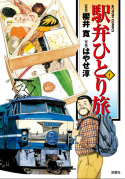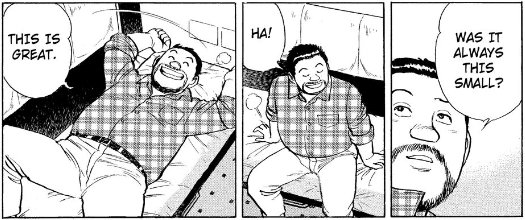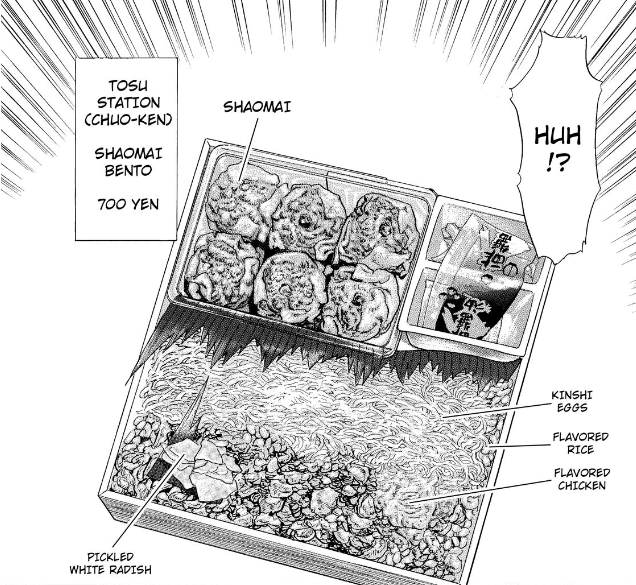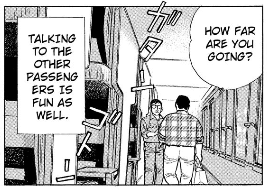 Drawn in a loose, improvisational style, Hiromu Arakawa’s Hyakusho Kizuko may remind readers of the gag strips that round out every volume of her wildly successful Fullmetal Alchemist. That’s not a knock on Hyakusho, by the way; like her fellow sister-in-shonen Yellow Tanabe, Arakawa’s omake are every bit as entertaining as her more polished stories, offering her a chance to riff on favorite characters, complain about her job, and reflect on her previous career as a dairy farmer.
Drawn in a loose, improvisational style, Hiromu Arakawa’s Hyakusho Kizuko may remind readers of the gag strips that round out every volume of her wildly successful Fullmetal Alchemist. That’s not a knock on Hyakusho, by the way; like her fellow sister-in-shonen Yellow Tanabe, Arakawa’s omake are every bit as entertaining as her more polished stories, offering her a chance to riff on favorite characters, complain about her job, and reflect on her previous career as a dairy farmer.
In Hyakusho Kizuko, however, the focus is squarely on the joys and hardships of farm life, rather than the pressures of bringing a popular comic to press. Arakawa shares humorous anecdotes about her ongoing war with the Hokkaido squirrel, a skilled crop thief, as well as her family’s penchant for using animal medicines to cure their own ailments. She also waxes poetic about the temperament of cows — apparently, they make great pets — and celebrates Hokkaido’s important role in feeding the rest of Japan. (As she notes in chapter seven, Japan’s dependence on imported food would rise from 50% to 80% if Hokkaido stopped supplying the other islands with its agricultural products.)
Arakawa doesn’t neglect her life as an artist; throughout the stories, we see her interact with her editor, who’s decidedly skeptical about the marketability of agricultural manga. “How come you’ve written about poop two chapters in a row?” her exasperated editor asks. “In a farmer’s story, poop is your friend,” Arakawa cheerfully counters. Besides, Arakawa notes, her manga explores other topics: “I also mention cow teats,” she declares.
As these matter-of-fact exchanges suggest, Arakawa is eager to educate Japanese readers about where their food comes from. She drops facts about food consumption, discusses cow bloodlines, decries government interference in dairy production, and describes what happens to animals that don’t contribute to a farm’s bottom line. She does so with a light hand, however, interspersing the more serious discussions about sustainability with sight gags involving wild bears, foolish tourists, and barn cats.
None of these passages would be entertaining (or edifying) were it not for a solid adaptation. I’ve complained in the past about other JManga titles, which sometimes suffered from overly literal translations; witness Otaku-Type Delusional Girl, better known in English as Fujoshi Rumi. Hyakusho Kizuko, however, is a pleasant surprise; the translator has done an excellent job of rendering the text in fluid, conversational English that’s a genuine pleasure to read. In fact, the best compliment I could pay the translator is to note that I actually laughed out loud reading several passages.
I’d be the first to admit that Hyakusho Kizuko won’t be every FMA fan’s idea of a good read; folks who like Arakawa best when she’s staging magical combat may find the information-dense passages too didactic for their tastes. For curious city dwellers, however, Hyakusho Kizuko will be a revelation, offering them an entertaining look at the day-to-day operations of a working farm. Highly recommended.
HYAKUSHO KIZOKU, VOL. 1 • BY HIROMU ARAKAWA • SHINSOKAN PUBLISHING CO., LTD. • 139 pp. • NO RATING









 Until December 27th, sign up for a paid subscription at
Until December 27th, sign up for a paid subscription at 



 MICHELLE: The big news in the manga sphere this week was
MICHELLE: The big news in the manga sphere this week was  SEAN: As has been noted, I’ve already reviewed a manga from Futabasha, Urameshiya. I therefore wanted to highlight something new by another company. Shonen Gahosha has only free previews (in Japanese) of its titles best known here in America – Excel Saga, Hellsing, and Trigun). But it does have Volume 1 in English of a title that has not been released here –
SEAN: As has been noted, I’ve already reviewed a manga from Futabasha, Urameshiya. I therefore wanted to highlight something new by another company. Shonen Gahosha has only free previews (in Japanese) of its titles best known here in America – Excel Saga, Hellsing, and Trigun). But it does have Volume 1 in English of a title that has not been released here –  MJ: With so much to choose from, I hardly know where to start! But I do have my eye on
MJ: With so much to choose from, I hardly know where to start! But I do have my eye on  DAVID: One of my personal fascinations is fixated on comics that explore the way people work and the way that activity factors into their lives. I love just about any comic that’s set in a workplace in a meaningful way, and I think there are far too few of them. So the first offering to really grab my attention would have to be
DAVID: One of my personal fascinations is fixated on comics that explore the way people work and the way that activity factors into their lives. I love just about any comic that’s set in a workplace in a meaningful way, and I think there are far too few of them. So the first offering to really grab my attention would have to be